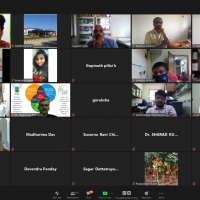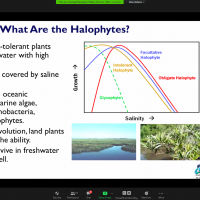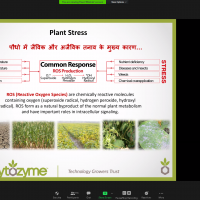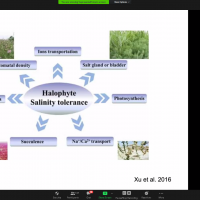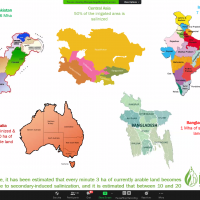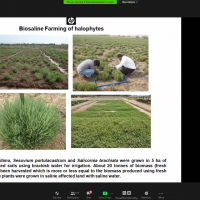National Webinar on Halophytes for Alleviating Salinity Stress in Agriculture: Potentials and Problems held on September 30, 2020
The ICAR–National Institute of Abiotic Stress Management (NIASM), Baramati organized National webinar on “Halophytes for Alleviating Salinity Stress in Agriculture: Potentials and Problems” on 30th September, 2020. The aim the webinar was to explore the scope for utilisation of halophytes under abiotic stress conditions; source of microbes and genes for abiotic stress tolerance; identifying major researchable issues in utilising coastal and inland halophytes as feed and fodder crop and to create awareness on the role and value of potential halophytes for diversification of Indian food.
Dr. Himanshu Pathak, Director, ICAR-NIASM, highlighted the potential of halophytes as an alternative in a cropping system under abiotic stressed regimes. He further suggested for addressing major researchable issues related to cultivation practices, value addition and marketing of promising halophytes.
The webinar started with an overview, welcome address and followed by brief introduction about the speakers by Dr. Jagadish Rane, I/C Head SDSM, ICAR-NIASM and Secretary Society for Agricultural Research on Abiotic Stresses, India. The webinar included expert’s lectures, views and discussions on various aspects of halophytes. Dr. Pawel, Director of Technical Support for Cytozyme, Salt Lake City UT, USA outlined seaweed based products for abiotic stress tolerance in crop plant. Dr. Penna Suprasanna, Nuclear Agriculture and Biotechnology, Division BARC, Mumbai provided comprehensive information about the potential of halophytes in bio-saline agriculture and degraded land for enhancing farmer income via value addition. He presented various uses of halyphytes. Dr. Dionysia A. Lyra, Halophyte Agronomist, Directorate of Programs International Center for Biosaline Agriculture, Dubai, United Arab Emirates gave very informative talk on how halophytes could be a potential source of future food and livelihood security in desert and saline ecosystem. Dr. R. Ramasubramanian, Principal Coordinator Coastal Systems Research Programme of MSSRF elaborated on bioremediation of salinity by halophytes.
The webinar provided an opportunity to listen the experts from different disciplines from India and abroad for more than 150 participants which included scientists, entrepreneurs and students. The help and support extended by Dr. Kamlesh, K. Meena, I/C Head SESM, Mr Satish Kumar, Scientist (Biochemistry), Dr. G.C. Wakchaure, Sr Scinetist (AS& PE) and Er. Pravin More, Sr. Tech. Asst. for successful organisation of webinar is duly acknowledged.
The webinar concluded with closing remarks from Director NIASM who emphasised to utilise the knowledge about halophytes for enhancing farmers income and also for other purposes. He emphasised on establishing research collaboration with national and international institutes for further research and promotion of halophytes as alternative food, remediation of salt affected soil, amelioration of abiotic stresses and for understanding the traits and genes associated with salt tolerance for improvement of crops.

